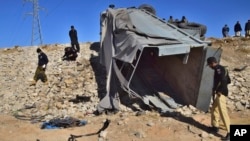The United States has again denied leaving any weapons in Afghanistan during the American military’s withdrawal from the country in August 2021, dismissing such allegations as “farce."
John Kirby, U.S. National Security Council coordinator for strategic communications, made the comments Tuesday just days after Pakistan urged the United Nations to investigate how Afghan-based militants are acquiring “sophisticated weapons” to carry out terrorist attacks in the country.
“This is a fallacy, this is a farce. What we did, over the course of our 20 years in Afghanistan, of course, with congressional approval and consultations, was arm and help equip the Afghan national security forces,” Kirby told a White House news conference.
He explained that in the face of advances by the Taliban insurgency during the U.S. troop withdrawal, many Afghan forces had decided not to fight and lay down their arms.
“The 'arms' that you're talking about, and again, I can't verify these particular reports, belonged to the Afghan national security forces,” Kirby said.
“That’s what was left behind. Not that the United States just walked away and abandoned a bunch of weapons in a pile in Afghanistan. That's simply not historically accurate.”
Pakistani authorities maintain militants linked to the banned Tehrik-i-Taliban Pakistan, or TTP, have intensified cross-border attacks from Afghan sanctuaries since the foreign troops withdrew and the Taliban seized power in the neighboring country two years ago.
The TTP and other militant groups have for years carried out bombings and other terrorist raids in Pakistan, but officials say militants are increasingly launching lethal attacks against security forces using U.S.-made modern weaponry.
Usman Jadoon, Pakistan’s deputy permanent representative to the U.N., raised the issue last week during a Security Council open debate on addressing the threat posed by diversion, illicit trafficking, and misuse of small arms and light weapons to peace and security.
Jadoon demanded “an investigation into how the TTP acquired the sophisticated weapons” being used against his country.
Local media quoted him as telling the meeting that “terrorists and criminals do not manufacture these advanced arms; instead, they acquire them from illicit markets or entities with intentions to destabilize specific regions or countries.”
Jadoon did not name the U.S., but Pakistani Prime Minister Anwaar-ul-Haq Kakar told foreign media journalists in September that military equipment left behind during the American withdrawal from Afghanistan had “greatly enhanced the fighting capacity” of TTP and other anti-state groups.
“We are not accusing the U.S. of anything that we would need to share evidence (for),” Kakar said when asked if Pakistan had presented evidence to Washington that its military equipment was now being used against Pakistan.
However, Kakar called for a “coordinated approach” to tackle the challenge of the leftover equipment.
The U.S. military built and trained tens of thousands of Afghan security forces at the cost of more than $80 billion during its two-decade-long presence in the country.
More than $7.1 billion in U.S.-funded military equipment was in the inventory of the former Afghan government when it collapsed in the face of insurgent Taliban nationwide attacks amid the foreign troop exit, the U.S. Defense Department estimated in a report released last year.
Taliban authorities have repeatedly rejected allegations that weapons have fallen into the hands of militants, saying "equipment and vehicles are stored and saved in depots, and no one is allowed to smuggle or sell even a single weapon.
Critics question those claims, saying TTP is a known close ally of the de facto Afghan rulers and fought with them against the U.S.-led international forces for years. The U.S. and the U.N. have listed TTP as a global terrorist organization.
Last July, the Geneva-based independent Small Arms Survey published a report warning that the groups allied with the Afghan Taliban, including TTP, continue to gain access to weapons of U.S.-trained and -equipped former Afghan security forces.
The report noted, citing field research, that “cross-border trafficking is continuing, and that Afghan-sourced arms are both available in Pakistani markets and fueling TTP violence against the Pakistani state.”
Pakistan says nearly 2,500 security forces and civilians have died in militant attacks across the country in the last two years. That toll includes last week's assault on a military base in a northwestern district that killed 23 soldiers, making it the deadliest attack in Pakistan’s recent history.




